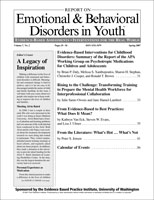Measuring and Improving School Climate: Evidence-Based Strategies to Promote Effective Risk Prevention, Health Promotion, and Learning in Youth
Author: Jonathan Cohen, Ph.D..
Source: Volume 08, Number 02, Spring 2008 , pp.37-46(10)

< previous article |next article > |return to table of contents
Abstract:
Historically, clinicians and others who have been concerned about emotional and behavioral disorders in youth have focused more on individual and family dynamics than on larger, systemic dynamics such as the norms and values that shape how we feel in school or at home. It is well known that individual, interpersonal, and small and large group processes are always interacting and co-shaping one another and that adults are always acting as social, emotional, ethical, and intellectual teachers—whether intentionally and helpfully or not. This paper is organized around the notion that school climate matters and that we can use evidence-based school climate assessment and improvement as a strategy to recognize and support K-12 students’ social, emotional, ethical, and intellectual development. In doing so, we can integrate individual and larger systemic “forces” that shape development and student’s capacity to learn.Keywords:
Affiliations:
1: Center for Social and Emotional Education (CSEE).